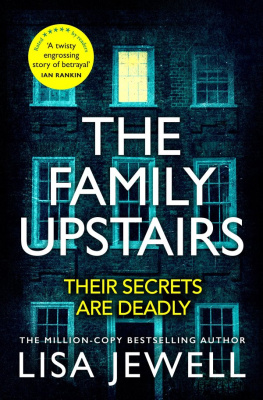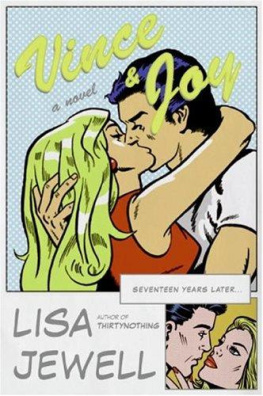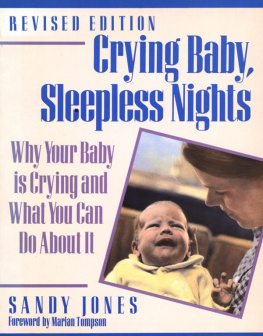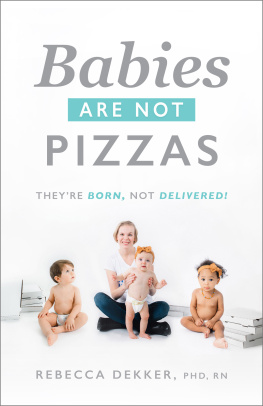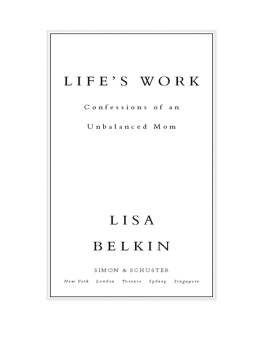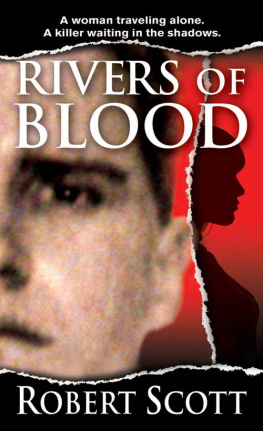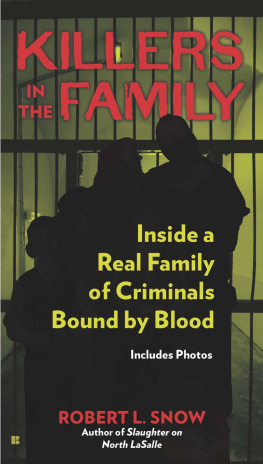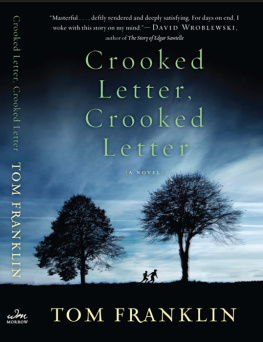THE
FAMILY
UPSTAIRS
LISA JEWELL

Contents
About the Author
Lisa Jewell was born in London. Her first novel, Ralphs Party, was published in 1999. It was the best-selling debut novel of the year. Since then she has published another sixteen novels, most recently a number of dark psychological thrillers, including The Girls and Then She Was Gone (both of which were Richard & Judy Book Club picks). Lisa is a top ten New York Times and number one Sunday Times author who has been published worldwide in over twenty-five languages. She lives in north London with her husband, two daughters, two cats, two guinea pigs and the best dog in the world.
Also available by Lisa Jewell
Ralphs Party
Thirtynothing
One-Hit Wonder
Vince & Joy
A Friend of the Family
31 Dream Street
The Truth About Melody Browne
After the Party
The Making of Us
Before I Met You
The House We Grew Up In
The Third Wife
The Girls
I Found You
Then She Was Gone
Watching You
This book is dedicated to my readers, with love and gratitude
It would be inaccurate to say that my childhood was normal before they came. It was far from normal, but it felt normal because it was all Id known. Its only now, with decades of hindsight, that I can see how odd it was.
I was nearly eleven when they came, and my sister was nine.
They lived with us for more than five years and they turned everything very, very dark. My sister and I had to learn how to survive.
And when I was sixteen, and my sister was fourteen, the baby came.
I
1
Libby picks the letter up off the doormat. She turns it in her hands. It looks very formal; the envelope is cream in colour, made of high-grade paper, and feels as though it might even be lined with tissue. The postal frank says Smithkin Rudd & Royle Solicitors Chelsea Manor Street SW3.
She takes the letter into the kitchen and sits it on the table while she fills the kettle and puts a teabag in a mug. Libby is pretty sure she knows whats in the envelope. She turned twenty-five last month. Shes been subconsciously waiting for this envelope. But now its here shes not sure she can face opening it.
She picks up her phone and calls her mother.
Mum, she says. Its here. The letter from the trustees.
She hears a silence at the other end of the line. She pictures her mum in her own kitchen, a thousand miles away in Dnia: pristine white units, lime-green colour-coordinated kitchen accessories, sliding glass doors on to a small terrace with a distant view to the Mediterranean, her phone held to her ear in the crystal-studded case that she refers to as her bling.
Oh, she says. Right. Gosh. Have you opened it?
No. Not yet. Im just having a cup of tea first.
Right, she says again. Then she says, Shall I stay on the line? While you do it?
Yes, says Libby. Please.
She feels a little breathless, as she sometimes does when shes just about to stand up and give a sales presentation at work, like shes had a strong coffee. She takes the teabag out of the mug and sits down. Her fingers caress the corner of the envelope and she inhales.
OK, she says to her mother, Im doing it. Im doing it right now.
Her mum knows whats in here. Or at least she has an idea, though she was never told formally what was in the trust. It might, as she has always said, be a teapot and a ten-pound note.
Libby clears her throat and slides her finger under the flap. She pulls out a sheet of thick cream paper and scans it quickly:
To Miss Libby Louise Jones
As trustee of the Henry and Martina Lamb Trust created on 12 July 1977, I propose to make the distribution from it to you described in the attached schedule
She puts down the covering letter and pulls out the accompanying paperwork.
Well? says her mum, breathlessly
Still reading, she replies.
She skims and her eye is caught by the name of a property. Sixteen Cheyne Walk, SW3. She assumes it is the property her birth parents were living in when they died. She knows it was in Chelsea. She knows it was big. She had assumed it was long gone. Boarded up. Sold. Her breath catches hard at the back of her throat when she realises what shes just read.
Er, she says.
What?
It looks like No, that cant be right.
What!
The house. Theyve left me the house.
The Chelsea house?
Yes, she says.
The whole house?
I think so. Theres a covering letter, something about nobody else named on the trust coming forward in due time. She cant digest it at all.
My God. I mean, that must be worth
Libby breathes in sharply and raises her gaze to the ceiling. This must be wrong, she says. This must be a mistake.
Go and see the solicitors, says her mother. Call them. Make an appointment. Make sure its not a mistake.
But what if its not a mistake? What if its true?
Well then, my angel, says her mother and Libby can hear her smile from all these miles away, youll be a very rich woman indeed.
Libby ends the call and stares around her kitchen. Five minutes ago, this kitchen had been the only kitchen she could afford, this flat the only one she could buy, here in this quiet street of terraced cottages in the backwaters of St Albans. She remembers the flats and houses shed seen during her online searches, the little intakes of breath as her eye caught upon the perfect place: a suntrap terrace, an eat-in kitchen, a five-minute walk to the station, a bulge of ancient leaded window, the suggestion of cathedral bells from across a green, and then she would see the price and feel herself a fool for ever thinking it might be for her.
Shed compromised on everything in the end to find a place that was close to her job and not too far from the train station. Thered been no gut instinct as she stepped across the threshold; her heart said nothing to her as the estate agent showed her around. But shed made it a home to be proud of, painstakingly creaming off the best that TK Maxx had to offer, and now her badly converted, slightly awkward one-bedroom flat makes her feel happy. Shed bought it; shed adorned it. It belonged to her.
But now it appears she is the owner of a house on the finest street in Chelsea and suddenly her flat looks like a ridiculous joke and so does everything else that was important to her five minutes ago the 1500-a-year rise shed just been awarded at work, the hen weekend in Barcelona next month that had taken her six months to save for, the Mac eye shadow shed allowed herself to buy last weekend as a treat for getting the pay rise the soft frisson of abandoning her tightly managed monthly budget for just one glossy, sweet-smelling moment in House of Fraser, the weightlessness of the tiny MAC bag swinging from her hand, the shiver of placing the little black capsule in her make-up bag, of knowing that she owned it, that she might in fact wear it in Barcelona, where she might also wear the dress her mother bought her for Christmas, the one from French Connection with the lace panels shed wanted for ages. Five minutes ago her joys in life had been small, anticipated, longed-for, hard-earned and saved-up-for, inconsequential little splurges that meant nothing in the scheme of things but gave the flat surface of her life enough sparkles to make it worth getting out of bed every morning to go and do a job which she liked but didnt love.
Now she owns a house in Chelsea and the proportions of her existence have been blown apart.

